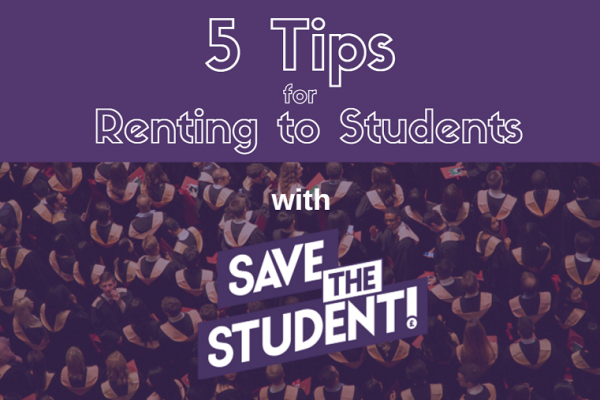With 14% of landlords letting to students, learning how to create a happy tenancy with people studying full-time is a skill many landlords will have to learn at some point. If you own property in a university town, accommodating the needs of the student population can be key to letting quickly and having a tenancy with minimal fuss.
Students don’t remain students for very long. Undergraduate degrees usually last three years. Graduate degrees last one or two, and even a PhD is likely to be wound up in three years. Luckily, the student market offers ready replacements every year, as a new cohort comes through to replace the last, offering landlords an appealingly reliable supply of new tenants.
6 Tips for Landlords Letting to Students
It’s an easy cliché that all student tenants will have loud parties and sell your furniture for beer and books. We all know that’s not true, of course. With students paying up half their monthly outgoings on rent alone, most students simply want a safe and warm place to live while they are away from home for the first time in their lives.
Even a tenancy deposit can be more cash than some students have ever had to pull together in one go – so you can bet they’re keen to keep it intact! And, as the cost of getting a degree inches upwards, the pressure is on to avoid unnecessary stress. Few students would choose to rile their landlord when they’ve already got a full plate of financial panic to deal with.
That doesn’t mean things don’t go wrong – there are definitely some issues that are more likely to pop up when renting to students. Here’s how to preempt them for a serene student tenancy!
First time in their own home
The largest segment of the UK’s student population are undergraduates. There were 800,000 undergraduates in 2018-19, compared to just 305,000 postgraduates. This means that the majority of students are likely to be 18 to 22-year-olds, renting in the UK for the first time.
Renting for the first time means that some of these potential tenants will be missing some home-maintenance skills. That doesn’t mean they don’t want to keep their home in good repair, however. It just means some of them may benefit from a few tips along the way.
Make sure you spell out the consequences of bad practice. For example, poor ventilation leading to mould and damp; noise leading to complaints from neighbours; damage to furnishings leading to deduction from the deposit to replace them. You can put these things in the contract or just give them a few pages of guidance as part of your key handover.
Be sure, too, to show your student tenants that you will be there if they need you and not to hide problems if they need repairing, such as leaks or boiler issues. Being proactive about how you have protected their deposit is a great way to secure trust early on.
Let out your property or room today with OpenRent
Get StartedRenting a Room – Consider letting individual rooms as opposed to a joint tenancy
If there’s one worry common to student renters, it’s that things might go wrong with their housemates, rather than with the house. Most students form house shares that constitute Houses of Multiple Occupancy (HMOs). But students may well prefer to only be responsible for their own deposit and their own room, instead of all tenants being jointly responsible.
Having individual contracts for each room in the property could make good sense here. It’s not so uncommon for students to drop out mid-course or for new friendships to hit the rocks mid-tenancy. Individual contracts mean that if one tenant wants to leave, they can do so without things getting complicated legally. It will also help if you plan to relet rooms to the holiday market during the summer if some tenants would prefer to move out during this period.
Communicate with your tenants
Make sure your tenants know you’re available, either via email, text or calling, early on. You don’t want to encourage them to call unnecessarily, but allowing them an easy way to mention anything wrong with the property will benefit them and you, as it will allow you to fix problems before they get worse.
Scheduling a property inspection for the midpoint of the tenancy makes good sense, too. Students are more likely than the average working adult to be at home at any given time. Keep this in mind when booking any property inspections or work you need to perform at the property. No one likes people coming into their home at an inconvenient time. They will also have some stressful periods around deadlines and exams – usually around Christmas and May to June.
Hold on to good student tenants
Students are likely to need digs for two, three, four years or even more. So once you’ve found tenants who pay on time and keep the house in good nick, keep hold of them. Renewing a tenancy with good tenants removes the chance of a costly void period for your property. Due to how much an empty property can cost you, it might be worth making some calculated concessions to help you hold onto good students.
For example, many students leave the property for long periods during the summer. Allowing them to sublet during this time would be a great incentive for students to stay with you. Remember that student communities are tight-knit, and good student houses are often limited. If your tenants like you, they are very likely to talk about their accommodation with other students – through word of mouth, they could find your next great tenants without you even having to advertise!
Add a guarantor to the contract
Although working while studying is common, it is unlikely that most tenants will earn enough to pass a referencing report’s affordability check. It is standard practice, therefore, to add guarantors to the contract to stand in and pay the rent for students. Often this will be a family member.
Other arrangements can exist, too, depending on how the student is funding their studies. They may receive loans, grants, scholarships or bursaries and these are unlikely to be monthly payments. They may be paid in one lump sum, or in termly installments (i.e. three times a year, coinciding with new terms). In this case, taking an amount of rent up front, e.g. six month’s rent, might be preferable for all parties.
Renting to international students
International students form a large contingent of the UK’s student community. These students are unlikely to have a guarantor in the UK, and guarantors must be based in the UK to be of any worth. For these students paying rent in advance can be a good solution. In general, international students shouldn’t be seen as more risky. No one wants to go through housing difficulties, especially not when renting for the first time in a foreign country.
Sometimes, universities will guarantee their students, especially at postgraduate level. This may be something to look into with your prospective international student tenant.
Order comprehensive referencing checks for tenants or guarantors quickly and easily. Order referencing



Start the discussion at community.openrent.co.uk